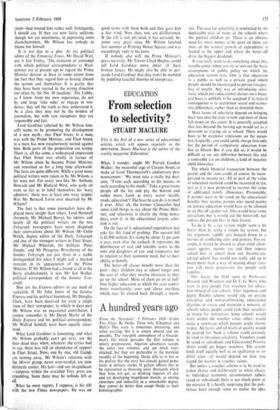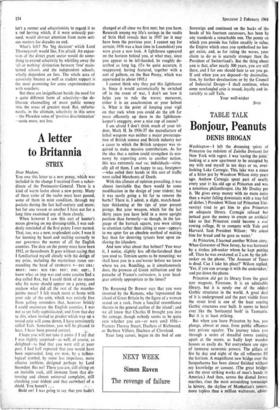From selection to selectivity?
EDUCATION STUART MACLURE
This is the first of a new series of educational articles which will appear regularly in the • SPECTATOR. Stuart Maclure is the editor of the - weekly magazine !Education.'
What, I wonder, ought Mr Patrick Gordon Walker, the mournful sage of Curzon Street, to make of Lord Thorneycroft's anniversary pro- nouncement: 'We must take a really big deci- sion. "From each according to his means, to each according to his needs." Take a great many people off the list and pay the bottom end rather more. Look at every sector—health, roads, education'? The least he can do is to mull it over. After all, the former Chancellor had some kind things to say about the Prime Mini- ster, and selectivity is clearly the thing nowa- days, even if, in the educational jargon, selec- tion is out.
On the face of it, educational expenditure just asks for this kind of probing. The current bill is £1,940 million. It's rising by about 31 per cent a year, even after the cutback. It represents the 'distribution of real and saleable assets to the sons and daughters of tax- and ratepayers, not in relation to their economic need, but to their ability to benefit.
The better-off classes benefit more than the poor—their children stay at school longer and the cost of what they receive increases as they go up the school. More of them go on to full- time higher education to which the state contri- butes munificently, over and above anything which may be clawed back through a means
test The case for selectivity is reinforced by the deplorable state of many of the schools where the poorest children go. There is an obvious need for more money to be spent on them, yet most of the natural growth of expenditure is loaded at the upper end where the better-off draw the biggest dividends.
. It you really want to do something about this, trouble comes when you try to sort out the basic
assumptions of public policy on which the education system rests. One is that education is a public as well as- a private good which people should be encouraged to pursue irrespec- tive of wealth. Any way of introducing selec- tivity which puts educational choices on a finan- cial basis is unlikely to be accepted if its logical consequence is to accentuate social and econo- mic differences, rather than to diminish them.
Most forms of selectivity depend on bringing back fees into the state system and most of them fall down on this count. It is generally accepted that fees beyond the leaving age would act as a deterrent to staying on at school. There would have to be extensive remissions on the means test. Logically, you could safely charge fees only for the period of compulsory education from five to fifteen. But if you did so, it would be difficult to see any difference between this and a remissible tax on children, a kind of negative child allowance.
The whole financial transaction between the parent and the state could, of course, be incor- porated in income tax. All or part of the value of education received could be recovered in tax, just as it is now proposed to recover the value of additional family allowances. Presumably, if parents were to be taxed on the educational benefits they receive, parents who spend Money on private education would have to be allowed to set this off against tax. This would have some attractions but it would aid the better-off, not redress the present bias in their favour.
To do it by a tax system might seem a bit better than by using a simple fee system, but the argument rapidly gets bogged down in a morass of conflicting aims and policies. For ex- ample, it would be absurd to allow child allow- ances against income tax and then impose school fees to cancel them out. Income-tax- related school fees would not really add up to much more than a way of making direct taxa- tion still more progressive for people with families.
This leaves the field open to Professors Peacock and Wiseman and Dr E. G. West, who want to give people free vouchers for educa- tion instead of free schools. Their ingenious and highly flexible scheme would rely on private enterprise and non-profitmaking educational charities to create and maintain a network of schools where people could cash their vouchers in return for instruction. Some schools would work within the voucher value, others would make a surcharge which parents could choose to pay. All tastes and all levels of quality would be catered for. Such a scheme could certainly be used to introduce selectivity. Vouchers could be taxed or subsidised; and Educational Priority Areas could get bigger vouchers. The system lends itself equally well to an egalitarian or an elitist view—all would depend on how you rigged the market in voucher values.
But unless a voucher scheme is to be used to widen choice and deliberately to relate choice to individual economic circumstances (albeit taxed or subsidised) there is not much point in the exercise. It is hardly surprising that the poli- ticians have enough sense to realise. the idea
isn't a runner and educationists to regar4 it as a red herring which, if it were seriously pur- sued, would distract attention from more seri- ous matters for decades on end.
- What's left? No 'big decision' which Lord Thorneycroft would like, I'm afraid. An expan- sion of the direct grant sector would do some- thing to extend selectivity by whittling away the 'all or nothing' distinction between 'free' main- tained schools and the independent schools, wholly dependent on fees. The whole area of university finance as well as student support is the most promising for some experimentation with vouchers.
But these are insignificant beside the need for a quite different form of selectivity--the de- liberate channelling of more public money into the areas of greatest need. But, unfortu- nately, in the ultimate, selectivity in this sense —the Plowden sense of 'positive discrimination' —costs more, not less.



































 Previous page
Previous page